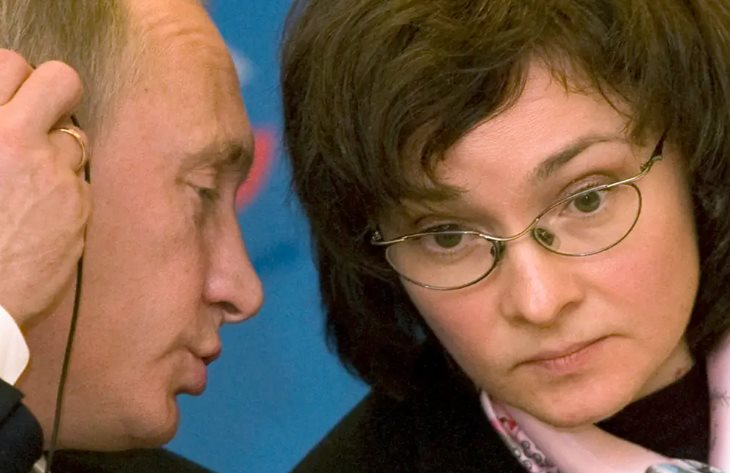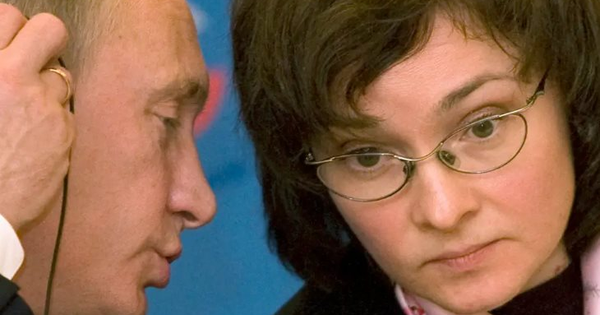Tổng thống Putin’s Unwavering Trust: A Guiding Hand in Russia’s Economy

There was a time when it was believed that the Russian economy would face significant challenges after being subjected to sanctions imposed by the West. However, the trajectory has not unfolded as expected.
To ensure the continued strength of the economy, President Vladimir Putin has been at the helm, and one woman, in particular, has captured attention – Elvira Nabiullina, the governor of Russia’s central bank.
Challenging the West’s Perceptions
Western nations have not been satisfied with Russia’s ability to withstand economic pressures. Their reactions have targeted not only President Putin but also Nabiullina, who has been included in the sanction lists of both the United States and the United Kingdom.
Daniel McDowell, a political science professor at Syracuse University, stated in an interview with Business Insider, “Despite immense pressure from the sanctions, Nabiullina has effectively stabilized the Russian economy.” He noted that she has employed effective measures to help restore the Russian ruble.
Russia’s central bank has also implemented strong policies to prevent capital flight, stabilize the markets, and prevent mass withdrawals from banks.
Furthermore, McDowell added, “Although living conditions in Russia have declined due to the sanctions, they could have been much worse without Nabiullina’s astute decision-making. It is only fair to say that she is a model for handling external sanctions.”
Nabiullina has garnered high praise for her support of the domestic economy. Christine Lagarde, the former managing director of the International Monetary Fund (IMF), described Nabiullina as someone who can draw attention to central banks.
Anders Åslund, a Swedish economist specializing in the Russian economy, wrote in the Moscow Times in March 2022, “I have never heard her utter a wrong word. It is difficult not to like her.”
Elina Ribakova, an economist at the International Institute of Finance (IIF), stated, “She is a symbol of stability within Russia’s financial system.”
Nabiullina, for over two decades, has held senior positions in Putin’s government. She served as an economic adviser to the president for more than a year before becoming the governor of the central bank in 2013. Previously, she was the Minister of Economic Development when Putin was the Prime Minister. Sofya Donets, an economist at Renaissance Capital in Moscow, evaluated, “She is trusted by the government and the president.”
Nabiullina was born into a Tatar minority family in Ufa, a city renowned for heavy industry. Her father worked as a driver, and her mother was a factory worker.
During her time at Moscow State University, Nabiullina was exposed to Western economic concepts that would later prove beneficial in her career.
In 1991, she became an economist at the Soviet Union’s Council for Mutual Economic Assistance. In 1994, she joined the Reform Bureau of the Russian Ministry of Economy.
In 1998, Nabiullina left her government position, but two years later, she returned as Deputy Minister of Economy. In 2007, Nabiullina was surprised when President Putin appointed her as Minister of Economic Development. This invitation marked a turning point in her career.
Nabiullina’s leadership role was further solidified in 2013 when President Putin appointed her as the governor of the central bank.
In 2014, amidst the Russia-Ukraine conflict and facing a series of Western sanctions, Nabiullina proved her worth, successfully safeguarding the Russian economy. In the following years, she received recognition and respect from international colleagues for connecting the Russian economy to the global system and modernizing the country’s central bank.
In 2015, Euromoney named Nabiullina Central Bank Governor of the Year. In 2017, The Banker also recognized her as the Central Bank Governor of the Year in Europe. In 2018, the International Monetary Fund (IMF) invited her to deliver a speech at the prestigious Michel Camdessus Lecture.
Despite facing strong blows from the West through sanctions, Russia’s economy remains resilient.
According to the Russian Federal State Statistics Service (Rosstat), the country’s economic growth in 2023 was 3.6%. The IMF predicts a 2.6% economic growth rate for Russia in 2024. Unemployment in Russia is also at record low levels, with increasing wages.
However, Russia’s economy is not without challenges. The country is currently grappling with labor shortages and brain drain. Nevertheless, Nabiullina has taken various measures to mitigate these issues, such as managing interest rates and controlling the money supply.
Alexei Makarkin, an analyst at the Center for Political Technologies in Moscow in 2022, analyzed for the Wall Street Journal that Nabiullina has been tough in tackling inflation.
Nabiullina is known to be candid about the realities of the Russian economy. In April 2022, she stated that Russia’s reserves will not last indefinitely. In January 2023, she also warned of the risks of an overheating economy.
Reference: Business Insider and New York Times.

